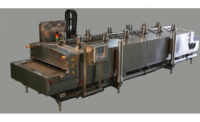Keeping snack and bakery operations productive through the coronavirus pandemic

Ever since public health officials first identified the novel coronavirus in Wuhan, China in December 2019, the insidious virus rapidly spread, infecting millions of people around the world and largely shutting down the global economy. But while many industries have ceased or seen a significant slowdown, food production continues as an essential businesses. In order to learn more about how the coronavirus pandemic is impacting day-to-day operations in the grain-based snack and bakery industry, we reached out to gain insight from three members of BEMA’s Baking Industry Forum (BIF): Scott Bieker, vice president bakery sales, Corbion, Lenexa, KS; Craig Souser, president and CEO, JLS Automation, York, PA; and Mike LaValle, corporate account manager, bakery & snack team, Intralox, Harahan, LA.
SF&WB: How has COVID-19 impacted production?
Scott Bieker: The retail portion of our business has been very strong and we anticipate a 15–25 percent increase to continue as long as the quarantines are in place.
Craig Souser: Fortunately, not in a big way. We have everyone that can work from home doing so, but our shop is at full strength—albeit a bit challenged in terms of efficiency, since we have instituted measures for safe distancing and extra steps in sanitizing equipment.
Mike LaValle: We saw a large spike of orders from our food customers toward the middle to end of March that were directly related to the COVID-19 situation.
SF&WB: What new safety steps are in place as a result of the COVID-19 pandemic?
SB: We have a total travel ban company-wide. Essential employees (who cannot do their jobs at home) are the only employees in our offices and plants. No visitors. Non-essential employees (who can do their job functions remotely) are working from home. Facilities are taking precautions like masks, gloves, staggered breaks, and ramped-up cleaning for those still on the job.
CS: We have divided the folks here into groups to provide for less opportunities for crowding, including the restrooms. We have gone to four 10-hour days in assembly so that folks are traveling here one less day per week. We are cleaning workspaces with sanitizers and have a professional company coming in to do a deeper clean daily. We have a questionnaire that we require for any visitors, which we limit to only truly necessary visits and never more than four in one group. We are doing some factory acceptance tests (FATs) virtually and with video. Everyone is required to wear a mask or face covering that we provide when they are in the vicinity of someone else. We are asking our team to self-police each other in terms of face covering and maintaining safe distances.
ML: We are practicing social distancing guidelines from the CDC in our manufacturing facilities, along with additional sanitizing of work areas, and all commercial, engineering, and customer support staff are working remotely from home.
SF&WB: How are you maintaining or improving production efficiency during the pandemic?
SB: Most of our customers have reduced the number of SKUs they are offering to retailers to gain efficiency and throughput. This is trickling down to us, and we are realizing similar results. We are running more main-line items and fewer specialty items. Plants are running extended days—i.e., longer shifts with skilled personnel. We continue to bring in additional employees (new hires) to get trained to address the demand.
CS: That’s the biggest struggle, with so many people remote and so many of the things that we put in place impacting efficiency in a negative way. We don’t see too many opportunities to increase efficiency given some of the constraints on us with best practices for hygienic safety.
ML: Currently it is business as usual, and we are running at about 80–85 percent capacity with no delays or disruptions in our supply chain as of today. All of our expedited services are still operating as normal.
Looking for a reprint of this article?
From high-res PDFs to custom plaques, order your copy today!






